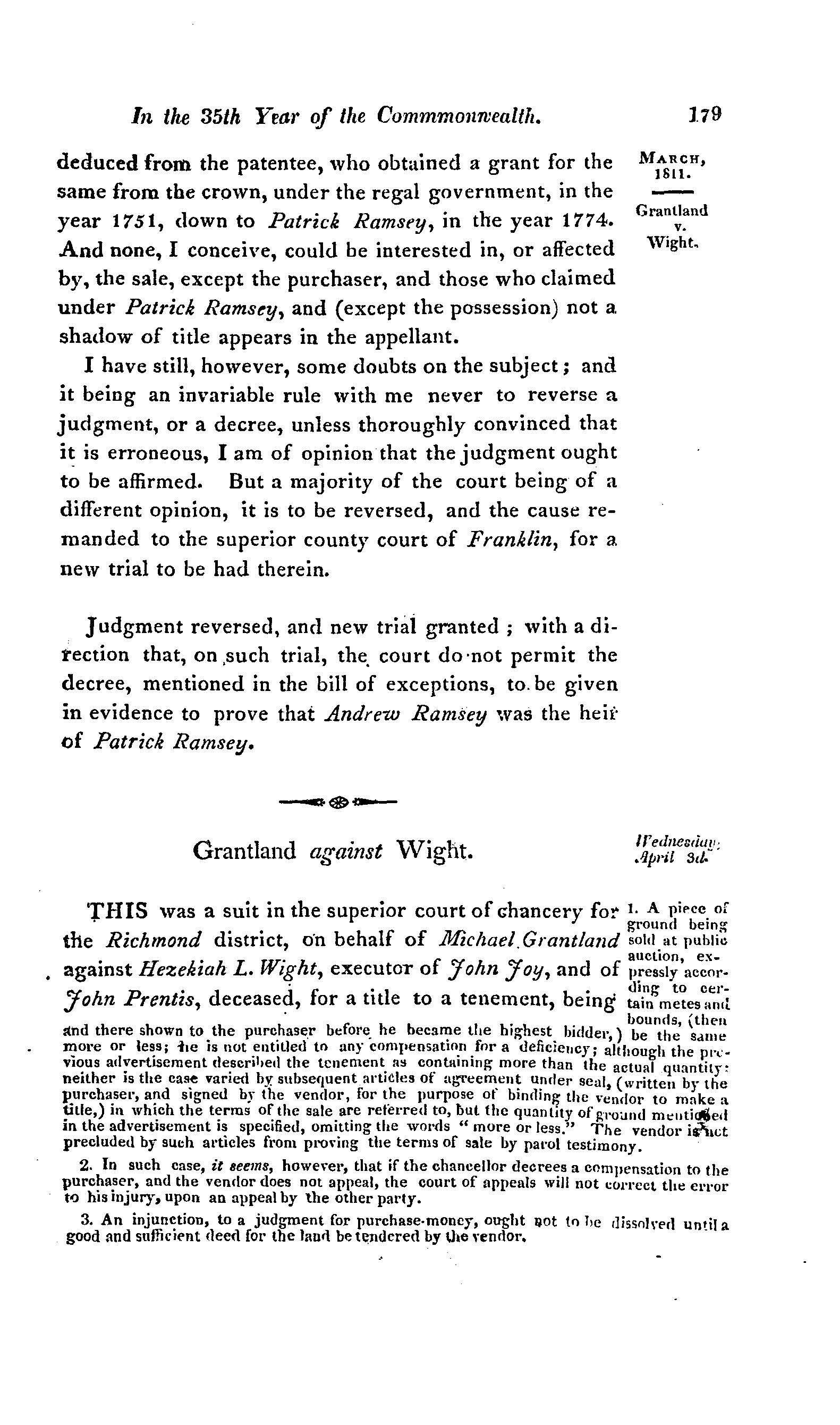Difference between revisions of "Grantland v. Wight"
From Wythepedia: The George Wythe Encyclopedia
(Created page with "{{DISPLAYTITLE:''Grantland v. Wright''}} File:MunfordsReports1814V2GrantlandvWight.pdf |link=Media:MunfordsReports1814V2GrantlandvWight.pdf f|thumb|right|300px|First p...") |
m |
||
| (9 intermediate revisions by 4 users not shown) | |||
| Line 1: | Line 1: | ||
{{DISPLAYTITLE:''Grantland v. Wright''}} | {{DISPLAYTITLE:''Grantland v. Wright''}} | ||
| − | [[File: | + | [[File:MunfordGrantlandvWight1854v1p179.jpg|link={{filepath:MunfordsReports1814V2GrantlandvWight.pdf}}|thumb|right|300px|First page of the opinion [[Media:MunfordsReports1814V2GrantlandvWight.pdf |''Grantland v. Wight'']], in [https://wm.primo.exlibrisgroup.com/permalink/01COWM_INST/g9pr7p/alma991017790199703196 ''Reports of Cases Argued and Adjudged in the Supreme Court of Appeals of Virginia''], by William Munford. New York: I. Riley, 1814.]] |
| − | [[Media:MunfordsReports1814V2GrantlandvWight.pdf |''Grantland v. Wight'']], | + | [[Media:MunfordsReports1814V2GrantlandvWight.pdf |''Grantland v. Wight'']], 16 Va. (2 Munf.) 179 (1811),<ref>William Munford, ''Reports of Cases Argued and Adjudged in the Supreme Court of Appeals of Virginia,'' (New York: I. Riley, 1814), 2:179.</ref> was a case where the heirs of an estate sued its executor for an official account of the estate and its upkeep. |
==Background== | ==Background== | ||
The Granberry heirs brought this case against the executor of their father’s estate for an account of the estate’s financial situation. While giving his report, the executor stated four exemptions to the estate to which Chancellor Wythe confirmed. The Granberry heirs appealed. | The Granberry heirs brought this case against the executor of their father’s estate for an account of the estate’s financial situation. While giving his report, the executor stated four exemptions to the estate to which Chancellor Wythe confirmed. The Granberry heirs appealed. | ||
| + | |||
===The Court's Decision=== | ===The Court's Decision=== | ||
The Court of Appeals reversed the exemptions of the report and remanded to the High Court of Chancery for an inquiry to be made according the principles of the appellate judges. | The Court of Appeals reversed the exemptions of the report and remanded to the High Court of Chancery for an inquiry to be made according the principles of the appellate judges. | ||
| + | |||
==See also== | ==See also== | ||
*[[Wythe's Judicial Career]] | *[[Wythe's Judicial Career]] | ||
| Line 16: | Line 18: | ||
__NOTOC__ | __NOTOC__ | ||
[[Category: Cases]] | [[Category: Cases]] | ||
| + | [[Category: Contracts]] | ||
| + | [[Category: Procedure]] | ||
Latest revision as of 13:59, 29 March 2022

First page of the opinion Grantland v. Wight, in Reports of Cases Argued and Adjudged in the Supreme Court of Appeals of Virginia, by William Munford. New York: I. Riley, 1814.
Grantland v. Wight, 16 Va. (2 Munf.) 179 (1811),[1] was a case where the heirs of an estate sued its executor for an official account of the estate and its upkeep.
Background
The Granberry heirs brought this case against the executor of their father’s estate for an account of the estate’s financial situation. While giving his report, the executor stated four exemptions to the estate to which Chancellor Wythe confirmed. The Granberry heirs appealed.
The Court's Decision
The Court of Appeals reversed the exemptions of the report and remanded to the High Court of Chancery for an inquiry to be made according the principles of the appellate judges.
See also
References
- ↑ William Munford, Reports of Cases Argued and Adjudged in the Supreme Court of Appeals of Virginia, (New York: I. Riley, 1814), 2:179.